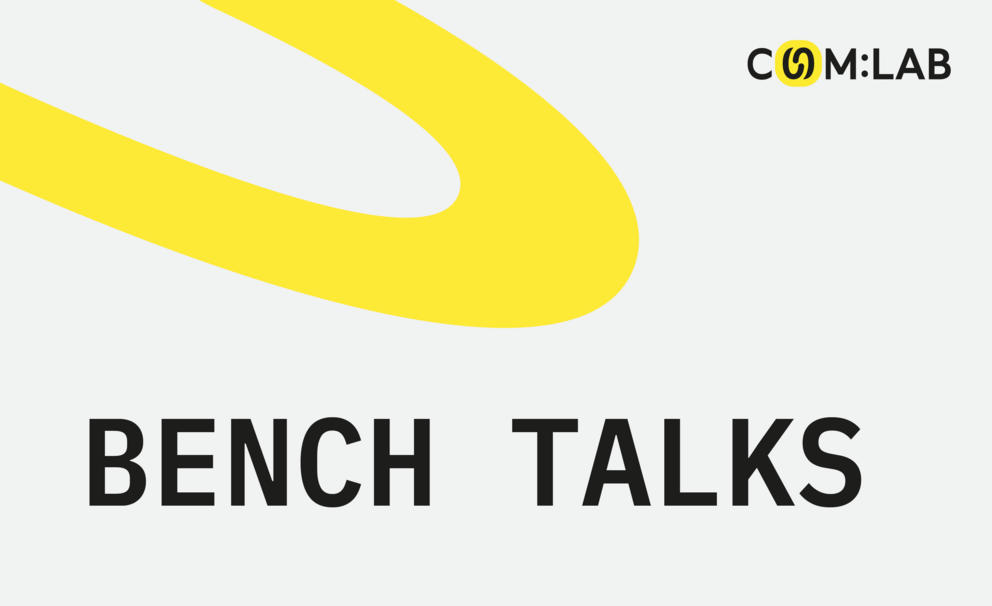Jump to the content
- {{#headlines}}
- {{title}} {{/headlines}}

Contact
Dr Stephanie Siewert
Programme Director
Communication Lab
Alexander von Humboldt Foundation
Berlin Office
Markgrafenstr. 37
10117 Berlin
GERMANY

Two people on a bench. Somewhere in Berlin. A researcher and a journalist discuss current world events and the state of science communication. A dialogue that offers a comparative view between different cultures and languages. An unscripted conversation of two professions that often hardly have the time to engage in an unplanned chat. Here, we take the luxury of “drifting” and “dwelling” in interdisciplinary space – which takes us to new perspectives for our global community.
Our thanks go to Amie Liebowitz for voiceover and Ellery Studio for editing.

Bench Talks is part of the Communication Lab, a joint programme of the Alexander von Humboldt Foundation and the International Journalists’ Programmes.
"Bench Talks" is also available here:
The future of biodiversity: Why we need better data and communication
How can we predict the future of biodiversity? What are the challenges in analysing cause and effect in ecological studies? And is species decline directly linked to climate change? In the new episode of our podcast series Bench Talks, macroecologist and Humboldtian Brian McGill (University of Maine) and science journalist Sahana Ghosh (Nature India) get together in Berlin to talk about global data collection, attribution and how smart investments and better communication can help protect life on earth.
Brian McGill is a Professor of Ecological Modelling at the University of Maine and a world-leading biodiversity scientist. He works at the intersection of biodiversity, human-caused global change, and big data approaches. He is a recipient of the Humboldt Research Award (2023) and was Editor-In-Chief of the journal Global Ecology and Biogeography for seven years. He is also one of three co-authors of the popular academic ecology blog, Dynamic Ecology.
Sahana Ghosh is an Associate Editor at Nature India. Trained in microbiology she now reports on science and environment with a special interest in the history of science. Among other things, she is working on a longer piece on deep-sea expeditions in the Indian Ocean in the 19th and 20th centuries and the significance of historical marine data in signalling the Anthropocene. She is a founding member of the Science Journalists’ Association of India and a member of the Oxford Climate Journalism Network.
Refugee crisis, digitalisation & the threat of gender-based violence online
In the second episode of Bench Talks, Daphnee Iglesias, former German Chancellor Fellow, UN Consultant, and specialist on data access and human rights protection, and Sarah Tekath, foreign correspondent on Women’s and LGBTQ rights, talk about the role of digitalisation in the global refugee crisis and the threat of gender-based violence and racism online. How exactly do technology and social media divide us? But how can they also help to create spaces of economic and social opportunity for women, and especially female refugees? Daphnee and Sarah share their professional and personal experience with gender discrimination.
Daphnee Iglesias is an alumna of the Alexander von Humboldt Foundation's German Chancellor Fellowship and lives in Bonn, Germany. She is a digitalization specialist studying the links between the increasing use and misuse of new technologies and their impact on countries' digital policies. She was a Policy Officer at the International Rescue Committee (IRC) and is a UN-IGF Advisor on Access and Connectivity.
Living in Amsterdam, Sarah Tekath works as a foreign correspondent for several German and international media, such as Euronews, neues deutschland and perspective daily. She is also a podcaster for Deutschlandfunk. Her topics span feminism, women’s rights, social issues and LGBT rights.
Climate communication, fake news & the Brazilian elections 2022
In the first episode of Bench Talks, Albert Steinberger, journalist at Deutsche Welle Brasil, and Fabio Fornari, sustainability researcher and alumnus of the German Chancellor Fellowship, talk about misinformation and climate change, the role of science and media in the 2022 Brazilian presidential elections, and what “debate” means or can mean in the age of fake news and populism.
Fabio Fornari is an alumnus of the Alexander von Humboldt Foundation's German Chancellor Fellowship in Berlin, originally from Brazil. As a tourism and sustainability expert his research focused on the climate agenda, sustainable tourism and the industry's response to the climate crisis. He is now a Product Manager at HRS responsible for the Green Stay Initiative, a proprietary solution that provides transparent information on the sustainability of hotel partners.
Albert Steinberger currently lives in Berlin and works as a TV correspondent and video reporter for Deutsche Welle. He specializes in international affairs. He has been working as a journalist for daily news and reports for 15 years. He has worked in front of and behind the camera for BBC World Service, ZDF, Deutsche Welle and the Brazilian TV station TV Globo.
Bench Talks is part of the Communication Lab: Twice a year, ten Humboldt Fellows meet up with ten journalists from the International Journalists’ Programmes. During a four-day workshop the participants discuss criteria of good research communication. In teams of two they develop a piece of cutting-edge science journalism, promoting dialogue between science and media.
